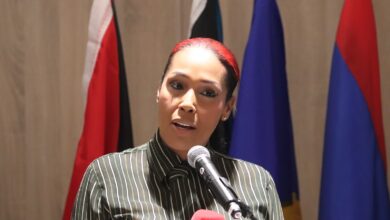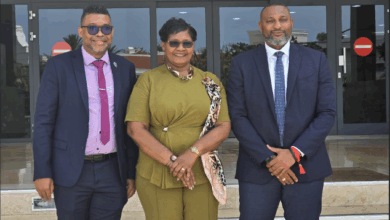Let me pay special tribute to our host, that titan of Caribbean integration and magnificent international statesman, the Most Honourable Percival J. Patterson. We simply thank you for your work and Almighty God for your inspiring life.
Today January 30, 2006, we reach and pass a milestone of historic proportions as the maturation process of our Caribbean Civilisation continues. This civilisation acknowledges the disparity of our roots, yet speaks clearly to the intimacy of our knowledge and understanding of each other, of our feelings of brotherhood and sisterhood, of our sense of ourselves as a unique people embarked on an extraordinary journey through life, with determination and commitment as we seek to mould our Caribbean community in our own image, likeness and interest.
It is here, in the landscape and seascape of the Caribbean, that the peoples of Africa and Europe, of India and Madeira, of the Middle East and China, and those indigenous to our Region, have come together through a conspiracy of history, politics and fate, to mould a civilization out of diverse peoples and cultures, spread among sovereign nations and countries, united in a singular goal – that of a better life for our people and a legacy which allows us to stand proud and tall.
And so it is that today, we celebrate ourselves as people of the Caribbean advancing by the stirrups of our own efforts, wisdom, leadership and vision for a better future. This is a great cause, and as the Right Excellent Norman Washington Manley averred at Montego Bay in 1947, “great causes are not won by doubtful men and women”.
I address you today as Chairman of the Organization of Eastern Caribbean States. The sentiments which I express today on behalf of the governments and people of the OECS, are in no way at odds with the fact that the OECS Member States are not at this time signing the instruments which will mark the coming into being of the Caribbean Single Market. We are signing on to an appropriate “Declaration of Intent” to get aboard the CSM train by June 30, 2006. Some OECS member states are ready now; others will be by June 30, the latest. On this issue we in the ECS have chosen to move as a group.
It is imperative that we understand the forces which have shaped the process of Caribbean integration and the immense contribution of what is now the OECS, to that venture and adventure. When some deemed us to have been recalcitrant, we were in fact taking positions that advanced the cause of regionalism. So we have an understanding of history and of our place in it. Today is no different. Let us examine briefly the reality of that history.
From the earlier days of the ferment towards the Caribbean unification, the small islands of the Eastern Caribbean have provided leadership in the struggle for the survival of the concept and reality of “One Caribbean”. The names Anderson of St. Vincent, Rawle of Dominica and Marryshow of Grenada come readily to mind during the pre-and-immediate-post-World War period, leading up to the “Closer Union” Conference in Montego Bay here in Jamaica, in 1947.
They understood then what the Calypsonian Stalin reminded us of later. That we are one. Most came on the “same ship”, even though at different times, from the same place. This leadership continued through the period of the Federation when the Windward and Leeward Islands contributed much to the governance of that arrangement.
The aftermath of the dramatic demise of the Federation however, revealed to the smaller entities of the Eastern Caribbean that they had to turn to themselves to advance their destiny, even while they continued to yearn for a wider commonness of purpose that they felt was that appropriate historic destiny of the whole Caribbean. Unless the trauma of that period when the “Little Eight” was cast adrift, is understood, it would be difficult for others to fully appreciate the caution which has since been a characteristic of the OECS grouping, in approaching the stage of wider Caribbean integration, even as they pursue their own processes of cooperation and unity.
The fact that Member States of the OECS are today not signature to the Declaration inaugurating the CSME, but are instead signing a Declaration of Intent, is consistent with the caution which we have had to exercise throughout the course of evolution from CARIFTA, to CARICOM, and now to CSME. And the caution is well-grounded in self-interest and restrains even those leaders in the OECS who are inclined to proceed more swiftly. Indeed, some, not unreasonably, think that the very signing of the Declaration of Intent today is unnecessary since our word has always been our bond. We sign today, nevertheless, out of a sense of symbolic solidarity, not out of a legal obligation.
In 1968, as an adjunct to CARIFTA, which it must be recalled, came into being with Antigua and Barbuda as one of the originators, along with Barbados and Guyana, the Eastern Caribbean States and territories established the East Caribbean Common Market, to enable themselves so that we could become effective participants in the arrangements under CARIFTA.
When CARIFTA evolved into CARICOM, the OECS grouping delayed the moment of their signing until they were satisfied that the new arrangement would cater to their special concerns and vulnerabilities as micro states. But sign on they did, one year later, and they have since demonstrated extraordinary commitment to the process, even during that problematic eight year period in the nineteen seventies and early nineteen eighties when there were no meetings of the Regional Heads of Government, because the leadership of the larger entities had difficulties in communicating any singleness of purpose.
Throughout the Common Market period, OECS Member Sates were always among the first to proceed with the implementation of decisions, whether these were related to the phases of the Common External Tariff (CET), or the Movement of skilled CARICOM nationals. The collapse of the Caribbean Multi-lateral Clearing Facility cannot be placed at the feet of the OECS. We paid our way. So let there be no mistake. The OECS stand proud of its record with regard to its commitment to, and support for, regionalism, but we owe it to the people of the OECS to ensure that our own strategic interests must be safeguarded under any new arrangements.
When on 18th June, 1981, the Founding Fathers signed the Treaty of Basseterre in the capital of St. Kitts and Nevis, to bring into being the OECS, they did so in full recognition of their obligations to the wider Caribbean Community. Article 3.1(a) of the Treaty of Basseterre, speaking to the purpose of the OECS, states as follows: “To promote co-operation among the Member States and at the Regional and International levels having due regard to the Treaty establishing the Caribbean Community….”.
The OECS takes full cognizance of its geopolitical reality. Its Member States are located at the very heart of the Caribbean. We are an inextricable part of the Caribbean Community, and we are integral to any arrangements designed to advance the purpose of this Community.
The CSME falls into that context. However, even as we are integral to these processes, so too do we expect that these very processes will ensure that we are fully accommodated, and that all necessary measures to assure that accommodation must be in place as provided for within the Revised Treaty of Chaguaramas. It is the commitment to such accommodation enshrined in the Revised Treaty which provided the comfort which we required to facilitate our signing.
Today, we remain mindful of the history to which I earlier alluded.
The OECS has therefore taken the principled position that, which we are fully committed to the process of regional integration, and intend to be full participants in the CSME, we must ensure that the provisions of the Revised Treaty of Chaguaramas which speak to our own special needs, are in effect. It is for this reason that we have sought from the Community, the deferment until the end of June for our full implementation of the Treaty.
This deferment has two objectives: The first is to provide additional time to complete the final legal processes in most of our Member States. The second is to ensure that the modalities directed by the Revised Treaty to facilitate our entry as effective participants in the CSME, are fully operationalised.
As we applaud today’s significance of the operations of the CSME, we do so not as a reluctant supporting cast, but as full actors whose time for entry on the stage is yet to come. Nevertheless, the story cannot be complete without that entrance and without us fulfilling our historic role in this process.
Even as we ready ourselves to do this, we continue to advance the cause of regional integration through the refashioning of the Treaty of Bassetere, 1981, to enable the OECS to move towards a more integrated policy and functional space, in the proposed OECS Economic Union.
It is our intention to unveil the OECS Economic Union Treaty on 18th June this year, as we celebrate the 25th anniversary of our grouping. The proposed OECS Economic Union will, within the framework of the rules and obligations set out in the Revised Treaty of Chaguaramus, enable effective decision making, policy coordination, and implementation of decisions within the sub region.
We view this momentous step as the most, if not the only, realistic pathway to enhancing the quality of lives of our people and to cement those achievements of the Caribbean Civilisation within the wider community. We view this historic step as a complement to the CSME, and as further enabling the OECS to be effective partners in the CSME, and the Caribbean Community.
We are therefore saying to the rest of the Community, that as we join you formally later on in this year, we shall not be coming to the rearguard, but to the vanguard of the regional integration process.
It is in this light that we celebrate today’s events with great joy. Far from being symbolic, the event celebrated here today stands out as a real milestone in the forward journey of Caribbean Civilisation.
My Brothers and Sisters, I thank you.





